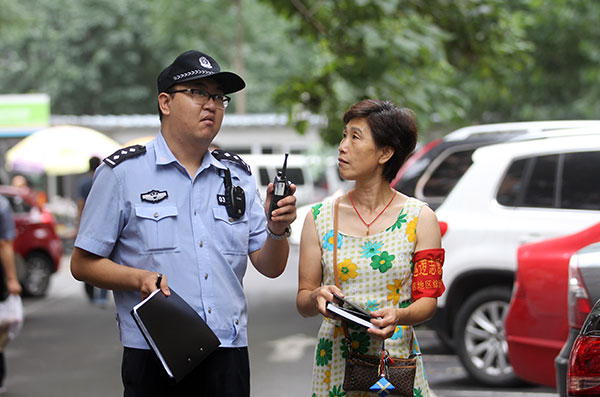 |
|
Yu Xiaohui, a resident of Beijing's Nongzhan Nanli community in Chaoyang district, tours the area with Wang Yang, a police officer. Yu is a volunteer who helps police keep a watch on the neighborhood. Zou Hong / China Daily |
Network's tipoffs have broken up drug gangs, tracked down terrorists
Beijing police detained an escaped prisoner suspected of organizing illegal immigration last summer, thanks to clues provided by an 80-year-old resident in the capital's Chaoyang district.
"I found the man had irregular work and rest and his home was often noisy at night," said Liu Shumin. "I pay attention to newcomers in our building, because I want the place I live in to be safe.

"So when I heard some noises in the corridor or from the man's home, I looked out through a peephole in my door. After about five observations, I decided to tell the police in charge of our area, because the new neighbor made me uncomfortable," said Liu, who lives in the district's Nongzhan Nanli community.
The man was swiftly confirmed as a criminal at large.
While recalling her contribution to clearing up the case, Liu was calm but proud. "I did it not for a reward. Instead, I did it for security, as I am a Beijing Chaoyang qunzhong (a Chinese word for one of the common people)," she said.
Beijing Chaoyang qunzhong have become a hot issue on Chinese social media for often appearing in police case-breaking announcements after providing important tipoffs.
When Beijing police solved prostitution and drug cases involving celebrities, they said in their statements that their actions were based on reports from Beijing Chaoyang qunzhong. The frequent mention of them aroused netizens' attention, and heated discussions have sprung up on who the Beijing Chaoyang qunzhong are and how they find clues.
Some even regard the qunzhong as an "intelligence agency", like the CIA, while others think they are another name for the police.
Yu Xiaohui, another resident of the community, said she found it funny to learn that what she does every day was "mythologized" online.
Yu and Liu, with another 100 residents of the area, form the security volunteer team in charge of reporting potential security risks to police and helping solve conflicts.
Wang Yang, a police officer responsible for the community, said that Beijing Chaoyang qunzhong are people willing to ensure security in their area.
Relying on residents
Yu, 54, goes out at 8 am every day, walking her dog and looking around the area she is asked to take charge of.
After retiring as a saleswoman 10 years ago, she volunteered to help protect security in her building, which has 18 households. Now, she knows every neighbor's name and is familiar with people who rent as well.
"I can quickly see if someone is a stranger and report potential security problems to Wang Yang," she said. "When I find someone behaving oddly, I dial a hotline in Wang's office and Wang will come within 10 minutes."
Wang expressed his thanks to the Beijing Chaoyang qunzhong like Yu. "They're helpers of mine. I couldn't handle all security risks without relying on them," he said.
The community, near Chaoyang's popular Sanlitun area, has more than 1,700 households with nearly 7,000 people, but only two police officers, including Wang. "So we need the security volunteers, including security guards and residents, to assist our work," he said.
The community has more than 100 volunteers, and over the past 12 years, no criminal case has originated there, Wang said.
"I provide the security volunteers with training, such as how to prevent telecom fraud and burglary, in the hope that they pass on the knowledge to more residents. I can also get some useful feedback or clues from them," said Wang, 35.
Many other Chaoyang residents are willing to do more to keep their area secure, including Xie Yuming, a man living in Panjiayuan community.
Xie set up three cameras around the community's parking lot after several car tires were punctured. Thanks to the cameras, the cases have stopped. They also helped police to track down and arrest a man suspected of stealing motorbikes.
"Establishing the cameras was to help others. If I can provide aid to other residents, I will be happy," Xie said.
In January, a Chaoyang resident discovered that his neighbor always stayed up all night. Police came to investigate and they quickly detained the neighbor.
He was suspected of using drugs and police seized more than 30 grams of "ice", according to Xinhua News Agency.
Based on the resident's report and information from the suspect, the police later broke up a gang of drug traffickers, the agency added.
Residents of Chaoyang have better security awareness and are eager to assist the police to deal with lawbreakers, said Li Jiangbo, a police officer in charge of drug-related crimes under the district's Public Security Bureau.
Li also said that 12 foreigners suspected of using drugs were arrested in April after police received clues from residents in a community where the suspects lived.
"We encourage people to report unsafe elements around them," said Wang.
He confirmed that police provide self-protection training for the security volunteers and ask them not to tackle offenders directly.
